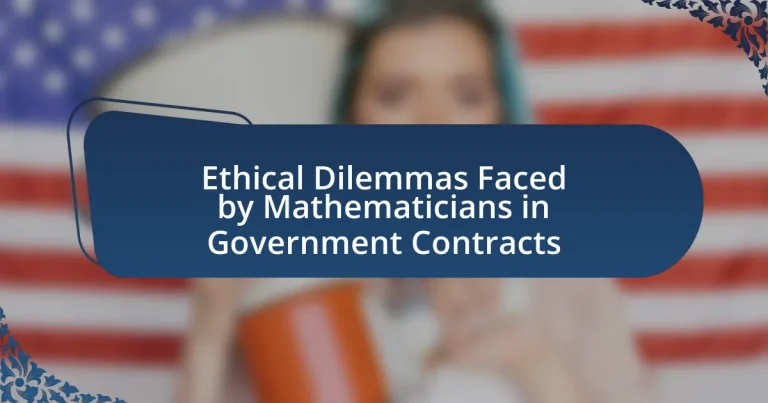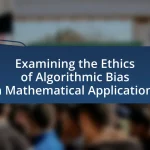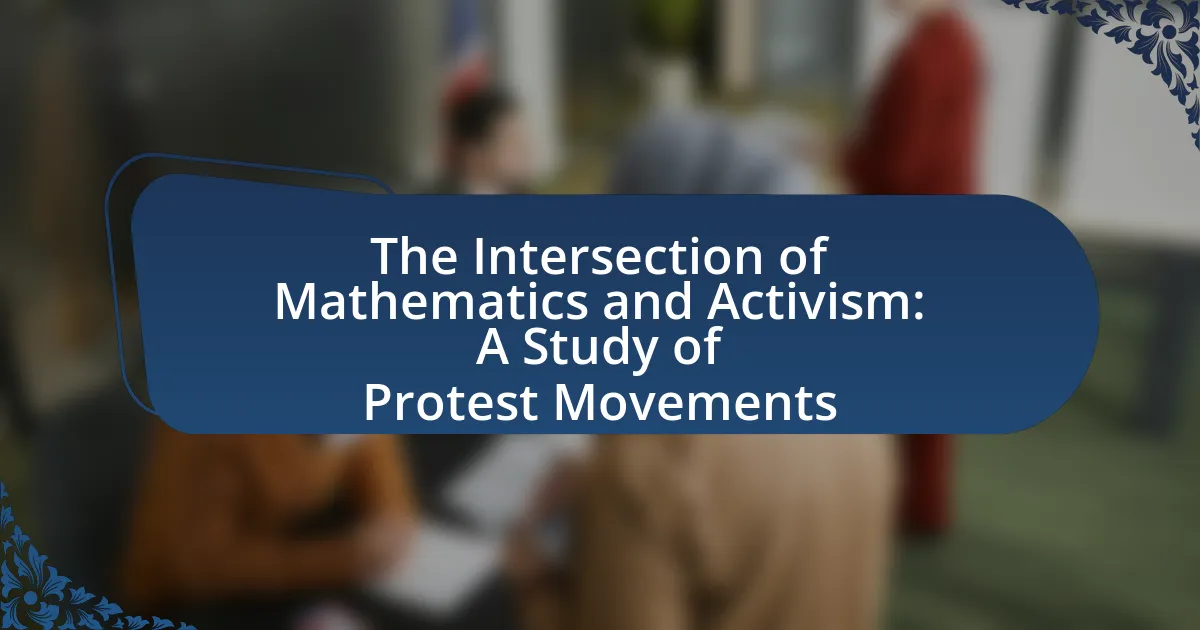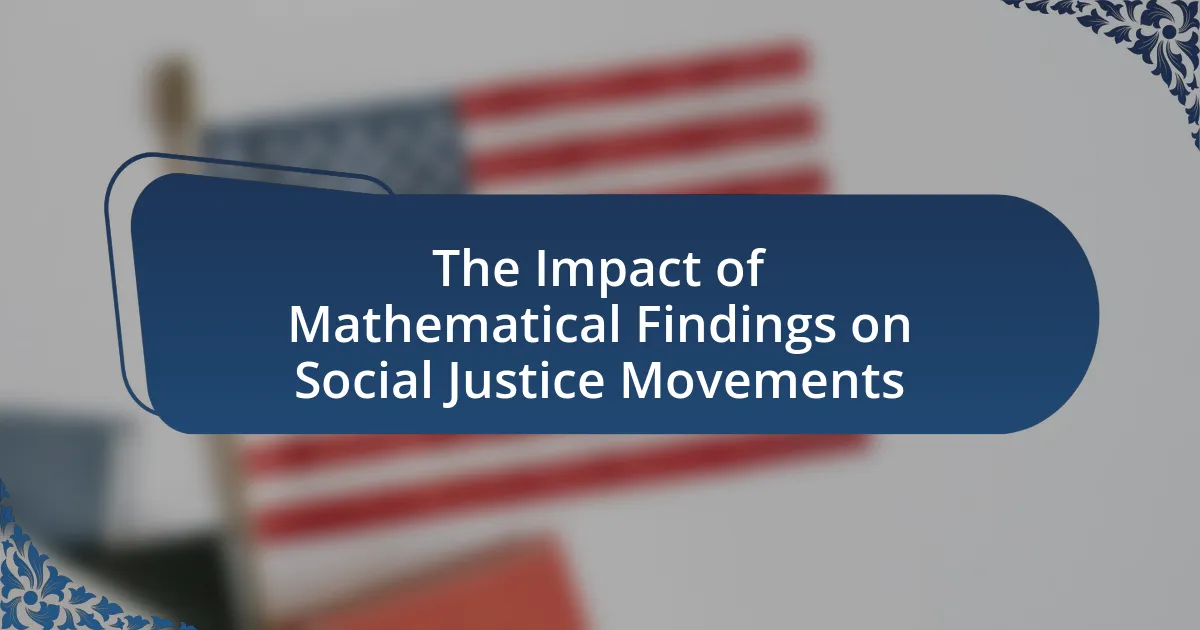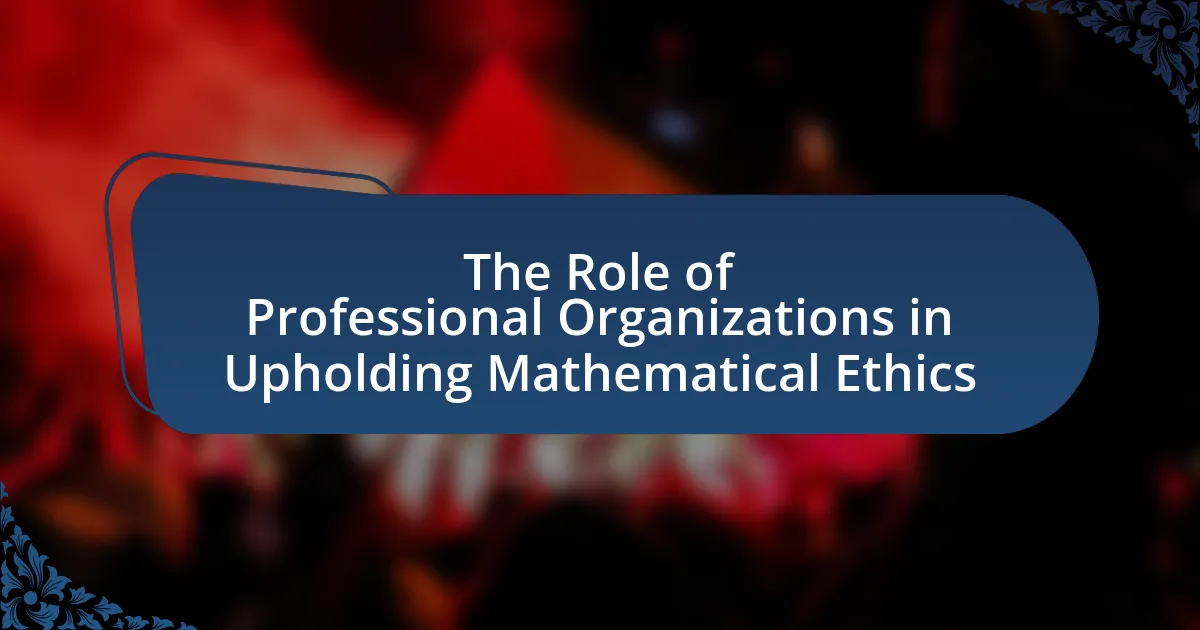Mathematicians engaged in government contracts encounter significant ethical dilemmas, particularly concerning their work’s application in military and surveillance contexts. These dilemmas often involve conflicts between professional integrity and government demands, such as the potential misuse of mathematical models for harmful purposes, including data manipulation and privacy violations. The article explores various scenarios that lead to ethical conflicts, the influence of personal values on decision-making, and the importance of transparency and accountability in maintaining public trust. Additionally, it outlines common ethical issues, strategies for addressing dilemmas, and resources available for mathematicians to navigate these challenges effectively.
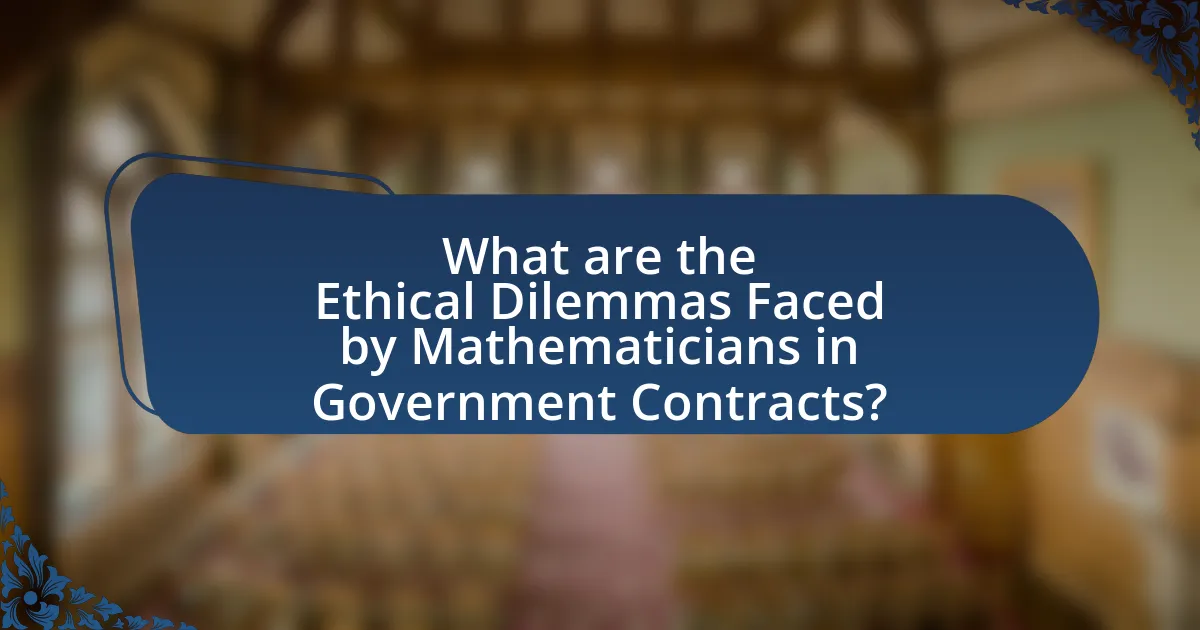
What are the Ethical Dilemmas Faced by Mathematicians in Government Contracts?
Mathematicians in government contracts face ethical dilemmas primarily related to the application of their work in military and surveillance contexts. These dilemmas arise when mathematical models and algorithms are used to develop technologies that may contribute to warfare, surveillance, or other activities that could infringe on civil liberties. For instance, mathematicians may grapple with the implications of their contributions to data analysis systems that enable mass surveillance, raising concerns about privacy and human rights. Additionally, the pressure to deliver results that align with government objectives can lead to conflicts between professional integrity and the potential misuse of mathematical findings. The ethical considerations are further complicated by the lack of transparency in government projects, which can obscure the societal impacts of the mathematicians’ work.
How do ethical dilemmas arise in the context of government contracts for mathematicians?
Ethical dilemmas arise in the context of government contracts for mathematicians primarily due to conflicts between professional integrity and the demands of government projects. Mathematicians may face situations where the objectives of a government contract conflict with ethical standards, such as when the work could contribute to harmful applications, like surveillance or military operations. For instance, mathematicians involved in cryptography may grapple with the implications of their work being used for invasive monitoring, which raises questions about privacy and civil liberties. Additionally, the pressure to produce results within tight deadlines can lead to ethical compromises, such as manipulating data or misrepresenting findings to meet contractual obligations. These scenarios illustrate the complex interplay between ethical responsibilities and the practical realities of government contracts in the field of mathematics.
What specific scenarios lead to ethical conflicts for mathematicians?
Ethical conflicts for mathematicians often arise in scenarios involving government contracts where their work may contribute to military applications or surveillance technologies. For instance, when mathematicians develop algorithms for data analysis that could be used in drone warfare, they face dilemmas about the potential consequences of their contributions. Additionally, conflicts can occur when mathematicians are asked to manipulate data to support predetermined outcomes, undermining the integrity of their work. These situations highlight the tension between professional obligations and moral considerations, as mathematicians must navigate the implications of their research on society and human life.
How do personal values influence ethical decision-making in these situations?
Personal values significantly influence ethical decision-making in situations involving ethical dilemmas faced by mathematicians in government contracts. These values shape an individual’s perception of right and wrong, guiding their choices when confronted with conflicting interests, such as the obligation to uphold integrity versus the pressure to meet contractual demands. For instance, a mathematician who prioritizes honesty may refuse to manipulate data to favor a government agenda, while one who values loyalty might comply to maintain professional relationships. Research indicates that personal values are critical in ethical decision-making frameworks, as they serve as a moral compass that directs behavior in complex scenarios, ultimately affecting the outcomes of such dilemmas.
Why is it important to address ethical dilemmas in government contracts?
Addressing ethical dilemmas in government contracts is crucial to ensure transparency, accountability, and public trust. Ethical considerations directly impact decision-making processes, influencing the integrity of contracts and the responsible use of taxpayer funds. For instance, the U.S. Government Accountability Office reported that ethical lapses can lead to significant financial losses and undermine the effectiveness of government programs. By proactively addressing these dilemmas, government entities can mitigate risks, uphold ethical standards, and foster a culture of integrity within public service.
What are the potential consequences of ignoring ethical issues?
Ignoring ethical issues can lead to severe consequences, including legal repercussions, loss of public trust, and detrimental impacts on society. For instance, mathematicians involved in government contracts may face legal action if they engage in unethical practices such as data manipulation or misrepresentation of results, which can result in penalties or criminal charges. Additionally, public trust in government institutions can erode when ethical standards are compromised, leading to skepticism about the integrity of government-funded projects. This erosion of trust can have long-lasting effects on public cooperation and support for future initiatives. Furthermore, unethical decisions can result in harmful societal outcomes, such as the misallocation of resources or the implementation of flawed policies based on inaccurate data. These consequences underscore the critical importance of maintaining ethical standards in professional practices.
How can ethical dilemmas impact public trust in government projects?
Ethical dilemmas can significantly erode public trust in government projects by creating perceptions of misconduct or mismanagement. When government officials or contractors face ethical challenges, such as conflicts of interest or data manipulation, it can lead to skepticism about the integrity and effectiveness of the projects. For instance, a study by the Pew Research Center found that 70% of Americans believe that government corruption is a major problem, which directly correlates with their trust in government initiatives. This decline in trust can result in reduced public support, lower participation in programs, and increased scrutiny of government actions, ultimately undermining the success of essential projects.
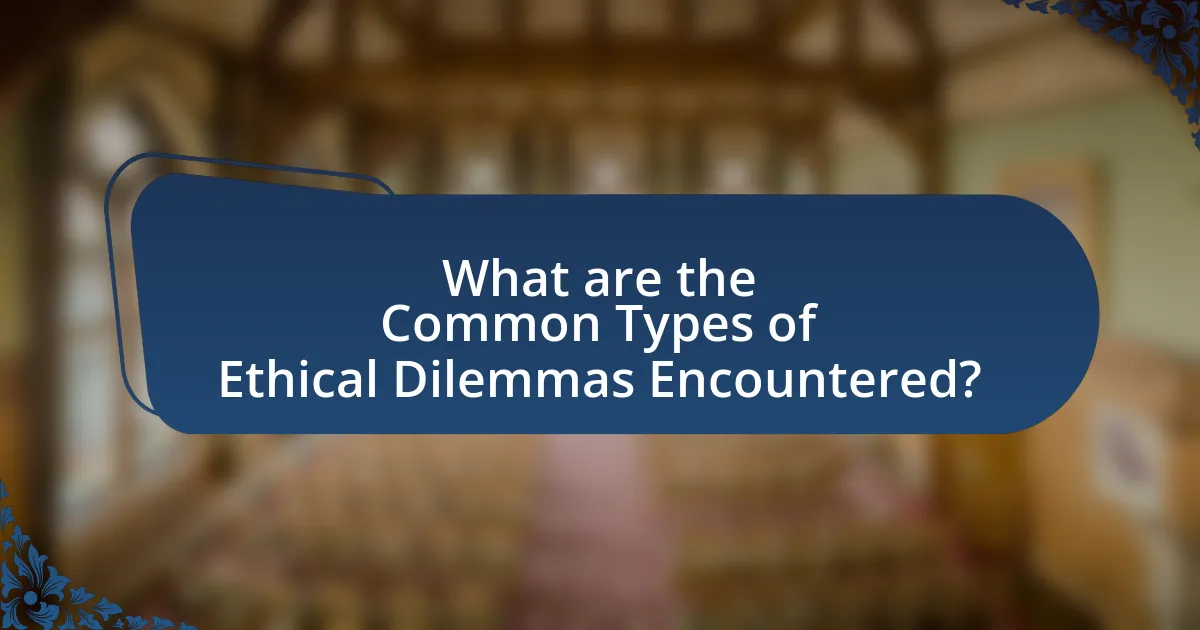
What are the Common Types of Ethical Dilemmas Encountered?
Common types of ethical dilemmas encountered by mathematicians in government contracts include conflicts of interest, data integrity issues, and the pressure to manipulate results. Conflicts of interest arise when personal interests interfere with professional responsibilities, potentially leading to biased outcomes. Data integrity issues involve the ethical obligation to report accurate and honest findings, which can be compromised under external pressures. Additionally, mathematicians may face pressure to manipulate results to meet governmental expectations or funding requirements, which undermines the credibility of their work. These dilemmas highlight the complex ethical landscape mathematicians navigate in government-related projects.
What are the most prevalent ethical issues faced by mathematicians in government contracts?
The most prevalent ethical issues faced by mathematicians in government contracts include conflicts of interest, data integrity, and the potential misuse of mathematical models. Conflicts of interest arise when mathematicians have personal or financial interests that could compromise their objectivity in research or analysis. Data integrity is critical, as mathematicians must ensure that the data used in their models is accurate and not manipulated to achieve desired outcomes. Additionally, the misuse of mathematical models can occur when results are presented without proper context, leading to misinterpretation or misapplication in policy-making. These issues are significant as they can undermine public trust and the effectiveness of government initiatives.
How do issues of data privacy and security present ethical challenges?
Issues of data privacy and security present ethical challenges by creating conflicts between the need for information access and the obligation to protect individual rights. For instance, government contracts often require mathematicians to analyze sensitive data, which raises concerns about unauthorized access and misuse of personal information. The ethical dilemma arises when the pursuit of data-driven insights conflicts with the responsibility to uphold privacy standards, as seen in cases where data breaches have led to significant harm to individuals, such as identity theft or loss of confidentiality. This tension highlights the necessity for strict ethical guidelines and robust security measures to ensure that data handling practices respect individual privacy while fulfilling contractual obligations.
What role does transparency play in ethical dilemmas?
Transparency is crucial in ethical dilemmas as it fosters accountability and trust among stakeholders. In the context of mathematicians working on government contracts, transparency ensures that decision-making processes are open and accessible, allowing for scrutiny and evaluation of ethical considerations. For instance, when mathematicians disclose their methodologies and data sources, it mitigates the risk of bias and promotes integrity in their work. Studies have shown that organizations with transparent practices are more likely to adhere to ethical standards, as transparency acts as a deterrent against unethical behavior by exposing potential conflicts of interest and misconduct.
How do conflicts of interest manifest in government contracts?
Conflicts of interest in government contracts manifest when individuals or organizations involved in the contracting process have personal or financial interests that could improperly influence their decisions. For example, a government official may award a contract to a company in which they have a financial stake, leading to biased decision-making that does not prioritize the public interest. This situation can undermine the integrity of the procurement process, as evidenced by cases where contracts were awarded based on personal relationships rather than merit, resulting in suboptimal outcomes for taxpayers. Additionally, regulations such as the Federal Acquisition Regulation (FAR) aim to mitigate these conflicts by requiring disclosure of financial interests and establishing guidelines for ethical conduct, yet violations still occur, highlighting the ongoing challenge of maintaining transparency and accountability in government contracting.
What are examples of conflicts of interest that mathematicians may face?
Mathematicians may face conflicts of interest when their personal financial interests, such as investments in companies that benefit from their research, clash with their professional responsibilities. For instance, if a mathematician is involved in government contracts that require unbiased analysis, but they hold stock in a company that stands to gain from favorable results, this creates a conflict. Additionally, mathematicians serving on advisory boards for private firms while also conducting research funded by government grants may experience conflicting loyalties, as their recommendations could influence both public policy and private profit. These scenarios illustrate the ethical dilemmas that arise when personal and professional interests intersect, potentially compromising the integrity of their work.
How can mathematicians navigate potential conflicts of interest effectively?
Mathematicians can navigate potential conflicts of interest effectively by implementing transparent disclosure practices and adhering to established ethical guidelines. Transparency involves openly communicating any financial or personal interests that may influence their work, which is crucial in maintaining integrity in government contracts. Adhering to ethical guidelines, such as those set forth by professional organizations like the American Mathematical Society, provides a framework for identifying and managing conflicts. These guidelines often include recommendations for recusal from decision-making processes when a conflict arises, ensuring that mathematicians prioritize the public good over personal gain.
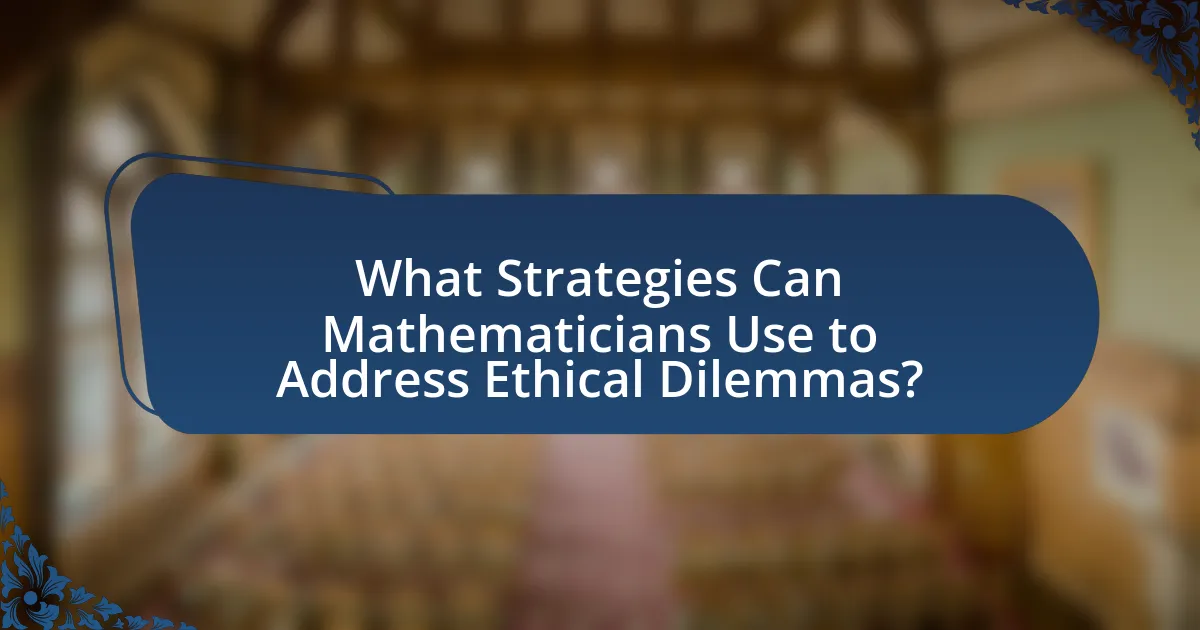
What Strategies Can Mathematicians Use to Address Ethical Dilemmas?
Mathematicians can address ethical dilemmas by implementing strategies such as adhering to established ethical guidelines, engaging in open dialogue with stakeholders, and conducting thorough risk assessments. Adhering to established ethical guidelines, such as those provided by professional organizations like the American Mathematical Society, ensures that mathematicians operate within a framework that prioritizes integrity and accountability. Engaging in open dialogue with stakeholders, including government officials and the public, fosters transparency and allows for diverse perspectives to be considered, which can lead to more ethical decision-making. Conducting thorough risk assessments helps mathematicians identify potential ethical issues before they arise, enabling proactive measures to mitigate risks associated with their work in government contracts. These strategies collectively enhance ethical awareness and promote responsible practices in mathematical applications.
How can mathematicians develop a framework for ethical decision-making?
Mathematicians can develop a framework for ethical decision-making by integrating ethical principles into their mathematical practices and decision processes. This involves establishing clear guidelines that prioritize transparency, accountability, and social responsibility in their work, particularly in government contracts where ethical dilemmas often arise. For instance, the American Mathematical Society emphasizes the importance of ethical standards in research and applications, advocating for mathematicians to consider the societal impacts of their work. By adopting such frameworks, mathematicians can ensure that their decisions align with ethical norms and contribute positively to society.
What principles should guide ethical decision-making in government contracts?
Ethical decision-making in government contracts should be guided by principles such as transparency, accountability, fairness, and integrity. Transparency ensures that all actions and decisions are open to scrutiny, which helps to build trust among stakeholders. Accountability holds individuals and organizations responsible for their actions, ensuring that they adhere to ethical standards and legal requirements. Fairness promotes equitable treatment of all parties involved, preventing favoritism and discrimination. Integrity involves maintaining honesty and strong moral principles, which is crucial for fostering a culture of ethical behavior. These principles are essential for mitigating ethical dilemmas faced by mathematicians and other professionals in government contracts, as they provide a framework for making decisions that align with public interest and ethical standards.
How can mathematicians seek guidance from professional organizations on ethical issues?
Mathematicians can seek guidance from professional organizations on ethical issues by consulting established codes of ethics and engaging in workshops or forums provided by these organizations. For instance, the American Mathematical Society and the Society for Industrial and Applied Mathematics offer resources that outline ethical standards and provide case studies relevant to ethical dilemmas. These organizations often host discussions and publish articles that address current ethical challenges, allowing mathematicians to gain insights and advice from experienced professionals in the field.
What best practices can mathematicians adopt to mitigate ethical dilemmas?
Mathematicians can adopt transparency, adherence to ethical guidelines, and continuous education as best practices to mitigate ethical dilemmas. Transparency involves openly communicating methodologies and findings, which fosters trust and accountability. Adhering to established ethical guidelines, such as those from professional organizations like the American Mathematical Society, ensures that mathematicians align their work with ethical standards. Continuous education on ethical issues, including attending workshops and engaging in discussions about ethical practices, equips mathematicians with the knowledge to navigate complex situations effectively. These practices collectively help mathematicians address and reduce ethical dilemmas in government contracts.
How can open communication with stakeholders help in resolving ethical issues?
Open communication with stakeholders facilitates the identification and resolution of ethical issues by promoting transparency and trust. When stakeholders, including mathematicians, government officials, and the public, engage in open dialogue, they can share concerns, clarify expectations, and collaboratively address potential ethical dilemmas. This collaborative approach can lead to more informed decision-making and adherence to ethical standards, as evidenced by studies showing that organizations with strong stakeholder engagement report fewer ethical breaches and improved compliance with regulations. For instance, a report by the Ethics & Compliance Initiative found that organizations with effective communication strategies experience a 50% reduction in misconduct.
What role does continuous education play in ethical awareness for mathematicians?
Continuous education plays a crucial role in enhancing ethical awareness for mathematicians by providing them with updated knowledge on ethical standards and practices relevant to their field. This ongoing learning process helps mathematicians navigate complex ethical dilemmas, particularly in government contracts, where the implications of their work can significantly impact society. Research indicates that professionals who engage in continuous education are better equipped to recognize and address ethical issues, as they stay informed about the latest developments in ethical guidelines and case studies. For instance, the National Council of Teachers of Mathematics emphasizes the importance of professional development in fostering ethical decision-making skills among educators and practitioners in mathematics.
What resources are available for mathematicians facing ethical dilemmas?
Mathematicians facing ethical dilemmas can access several resources, including professional organizations, ethical guidelines, and academic literature. Organizations such as the American Mathematical Society and the Society for Industrial and Applied Mathematics provide ethical guidelines and support for members dealing with ethical issues. Additionally, the “Ethics in Mathematics” resource by the Mathematical Association of America offers case studies and discussions on ethical dilemmas. Academic literature, including journals that focus on ethics in science and mathematics, also serves as a valuable resource for understanding and navigating these dilemmas.
How can professional organizations support mathematicians in ethical decision-making?
Professional organizations can support mathematicians in ethical decision-making by providing clear ethical guidelines and frameworks tailored to the specific challenges faced in government contracts. These organizations often develop codes of ethics that outline acceptable practices and decision-making processes, which serve as a reference for mathematicians when confronted with ethical dilemmas. For instance, the American Mathematical Society offers resources and workshops that focus on ethical considerations in mathematical research and applications, helping professionals navigate complex situations. Additionally, these organizations can facilitate discussions and forums where mathematicians can share experiences and seek advice from peers, fostering a community of ethical awareness and support.
What tools and frameworks can assist in evaluating ethical dilemmas?
Tools and frameworks that assist in evaluating ethical dilemmas include the Ethical Decision-Making Model, the Four Principles Approach, and the Utilitarian Framework. The Ethical Decision-Making Model provides a structured process for identifying ethical issues, considering the stakeholders involved, and evaluating the consequences of different actions. The Four Principles Approach, which emphasizes autonomy, beneficence, non-maleficence, and justice, helps individuals weigh ethical considerations in a balanced manner. The Utilitarian Framework focuses on maximizing overall happiness and minimizing harm, guiding decision-makers to consider the broader impact of their choices. These frameworks are widely recognized in ethical discussions and are supported by literature in ethics and decision-making, such as “Ethics in Government Contracting” by the National Academy of Sciences, which outlines the importance of structured ethical evaluation in public service.
